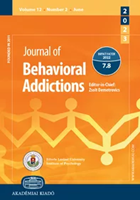Confidence and risky decision-making in gambling disorder
Confidence and risky decision-making in gambling disorder
Author(s): Monja Hoven, Alejandro Hirmas, Jan Engelmann, Ruth J. van HolstSubject(s): Social psychology and group interaction, Cognitive Psychology, Personality Psychology, Behaviorism, Substance abuse and addiction
Published by: Akadémiai Kiadó
Keywords: confidence; gambling disorder; risky decision-making; mixed-gamble; regret;
Summary/Abstract: People with Gambling Disorder (GD) often make risky decisions and experience cognitive distortions about gambling. Moreover, people with GD have been shown to be overly confident in their decisions, especially when money can be won. Here we investigated if and how the act of making a risky choice with varying monetary stakes impacts confidence differently in patients with GD (n 5 27) relative to healthy controls (HCs) (n 5 30). Methods: We used data from our previous mixed-gamble study, in which participants were given the choice of a certain option or a 50/50 gamble with potential gains or losses, after which they rated their confidence. Results: While HCs were more confident when making certain than risky choices, GD patients were specifically more confident when making risky choices than certain choices. Notably, relative to HCs, confidence of patients with GD decreased more strongly with higher gain values when making a certain choice, suggesting a stronger fear of missing out or “anticipated regret” of missing out on potential gains when rejecting the risky choice. Discussion: The current findings highlight the potential relevance of confidence and “regret” as cognitive mechanisms feeding into excessive risk-taking as seen in GD. Moreover, this study adds to the limited previous work investigating how confidence is affected in value-based risky contexts.
Journal: Journal of Behavioral Addictions
- Issue Year: 12/2023
- Issue No: 3
- Page Range: 840-846
- Page Count: 7
- Language: English

